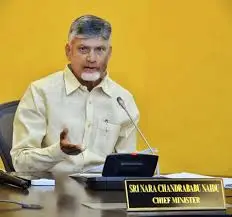Andhra govt ‘exploring ways’ to provide 100% reservation in tribal areas, Naidu says

Amaravati, May 13, 2025 — In a bold move to empower indigenous communities, Andhra Pradesh Chief Minister N. Chandrababu Naidu announced that his government is actively working on providing 100% reservation in government jobs and educational institutions within tribal areas.
During an interaction with tribal leaders in the agency regions of Alluri Sitarama Raju and Parvathipuram districts, Naidu emphasized the importance of inclusive governance. He reaffirmed his commitment to improving the lives of Scheduled Tribes (STs), one of the most marginalized groups in the state.
“Tribals Have the First Right Over Their Land and Resources”
Naidu said, “We are committed to the holistic development of tribal areas. We are exploring all legal options to ensure 100% reservation in jobs and educational seats within scheduled areas for tribal youth. Tribals have the first right over the resources of their land.”
He pointed out that the constitutional framework, particularly the Fifth Schedule and the Panchayats (Extension to the Scheduled Areas) Act (PESA), offers a path to strengthen tribal rights. He also assured that his administration would follow a legally sound approach to avoid any conflict with the judiciary.
Legal and Historical Background
The idea of full reservation in tribal areas isn’t new. In 2000, the Andhra Pradesh government implemented 100% reservation for STs in scheduled areas. But in 2001, the Supreme Court struck down the policy, citing the constitutional limit of 50% on reservations.
Now, Naidu’s team is exploring various strategies. These include creating tribal-exclusive recruitment zones, amending existing laws, or requesting the central government to support a constitutional amendment for an exception, similar to the ones under Article 15(4), 15(5), and 16(4A).
Consultations Underway
The Chief Minister has instructed officials from the Tribal Welfare Department to prepare a detailed white paper. Legal experts and community leaders are participating in this process to ensure the policy stands on firm legal ground.
Sources in the Chief Minister’s Office indicated that the government may hold a tripartite dialogue involving the state, Centre, and judiciary to seek support for the plan.
A Political Move Before Local Polls?
With local body elections approaching in tribal belts, the proposal carries strong political weight. The ruling Telugu Desam Party (TDP) wants to consolidate its support among tribal voters, who hold sway in more than 10 districts.
Opposition parties accused the TDP of using the policy for electoral gain. However, TDP leaders defended the proposal, calling it a continuation of Naidu’s track record in tribal welfare.
TDP Tribal Cell president B. Konda Raju stated, “This is not a gimmick. Naidu has always supported tribal communities through better education, healthcare, and infrastructure in agency regions.”
Tribal Communities React with Cautious Optimism
Tribal organizations expressed cautious optimism about the announcement. Members of the Adivasi Mahasabha welcomed the move but asked the government to ensure the proposal is practical and durable.
Mariamma Dora, a tribal teacher from Paderu, said, “We’ve heard such promises before. This time, we hope they lead to real change. Reservation is important, but so are better schools, hostels, teachers, and internet access.”
Supporting Policy Measures
The state government is also rolling out a set of tribal-focused development programs, such as:
- Expansion of Ekalavya Model Residential Schools (EMRS)
- Digital literacy and skill-building initiatives
- Tribal youth employment zones
- Mobile health services
- Distribution of forest land titles under the Forest Rights Act, 2006
Legal Experts Offer Caution
Constitutional experts urged the state to proceed carefully. Hyderabad-based lawyer K. Suresh explained, “While 100% reservation may seem ideal, the courts may reject it if the plan violates equality principles.”
He suggested the government focus on special recruitment drives and capacity building, rather than blanket quotas that courts might see as excessive.
What Lies Ahead?
The white paper will likely be introduced in the upcoming Assembly session. If passed, the state will formally ask the Centre for constitutional support to make the reservation plan legally valid.
This announcement has rekindled the debate on tribal rights in India’s federal structure. While the final outcome depends on legal and constitutional approvals, Naidu’s promise has raised fresh hope among many tribal communities in Andhra Pradesh.






